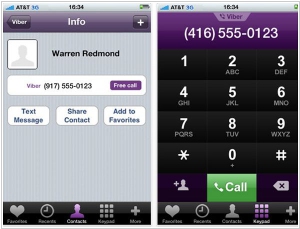Viber vs WeChat
June 07, 2023 | Author: Adam Levine
Viber and WeChat are both messaging and calling platforms, but they have distinct features and regional popularity. Viber, developed by Rakuten, offers messaging, voice and video calls, group chats, and multimedia sharing options. It is widely used globally and known for its strong focus on privacy and end-to-end encryption. Viber also offers features like public chats, stickers, and games. On the other hand, WeChat, developed by Tencent, is primarily popular in China and has a large user base in Asia. Alongside messaging and voice/video calls, WeChat provides social networking features, mobile payments, mini-programs, and access to a variety of services within the app. WeChat is known for its extensive functionality and its integration of multiple services in one platform.
See also: Top 10 Business Messaging platforms
See also: Top 10 Business Messaging platforms
Viber vs WeChat in our news:
2022. Messaging app Viber launches Payments - a new digital wallet
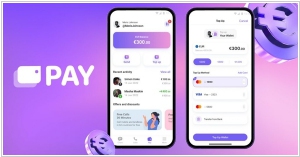
Viber, the messaging app owned by the Japanese e-commerce giant Rakuten, is introducing Payments on Viber, a new service that enables users to establish digital wallets linked to their Viber accounts. These Payments wallets can be connected to other bank accounts, as well as Visa and Mastercard, allowing users to make bill payments, purchase goods, and transfer money to other individuals. The initial launch of this service will focus on peer-to-peer transfers, which will be free of charge. However, there may be associated fees for services like payments to businesses. The service is initially rolling out in Germany and Greece, with plans to expand across Europe and eventually to Viber's broad global presence in 180 countries, spanning this year and the next.
2020. Viber launches group video calls for 20 users
Viber introduces its latest feature, the Group Video Calls, catering to the needs of large meetings and online classes. This new functionality allows for group video calls with a maximum of 20 participants and no time limit. Viber has already gained significant popularity with its Group Audio Calls, accommodating up to 20 individuals, and group chats, supporting up to 250 people. Given the current circumstances, Viber has expanded its capabilities by incorporating video communication. During Group Video Calls, the speaker is visible to all participants; however, users have the option to pin any video to their screen, whether it's their own or another participant's. Moreover, users can mute themselves or disable their video stream, as well as determine if other participants have activated the mute or video-off settings.
2017. Viber acquired shopping keyboard startup Chatter Commerce
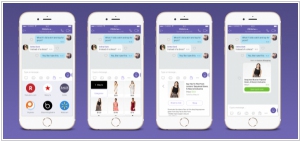
Earlier this year, messaging app Viber ventured into shopping services with its Instant Shopping feature, enabling users to search for items available for purchase directly within the app's interface. In a strategic move to compete with alternative platforms, Viber has recently acquired Chatter Commerce, the startup that played a significant role in developing this feature. This acquisition positions Viber to enhance its shopping capabilities. Speculations suggest that even Amazon is working on a consumer-centric messaging app. Additionally, Facebook has been expanding Messenger beyond basic chat, incorporating transactional features, bots, and other services. This highlights a notable trend among messaging apps, leveraging their existing user engagement to drive business growth through various avenues.
2017. Viber introduced secret chats with self-destructing messages
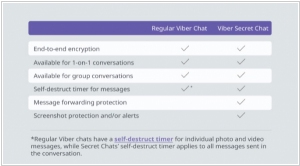
Viber has released an update for its iOS and Android versions, introducing the highly anticipated feature of "Secret Chats" to the service. Following in the footsteps of Snapchat, Facebook, Telegram, and other platforms, Viber now allows its users to set timers on their messages, resulting in self-destruction after a specified duration. Additionally, this new feature notifies the sender if the recipient takes a screenshot, a functionality initially popularized by Snapchat. Viber appears to be emphasizing its commitment to security by showcasing these features, setting itself apart from other messaging platforms. The introduction of end-to-end encryption and hidden chats last year further solidified Viber's dedication to privacy and security.
2017. Viber adds e-commerce feature
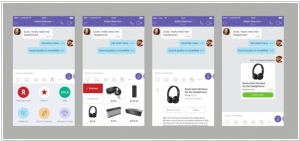
Messaging app Viber, owned by e-commerce company Rakuten, aims to capitalize on e-commerce while avoiding intrusive advertising. Viber plans to introduce a new feature where users can explore items for sale related to their current chat by tapping on a small shopping bag icon at the bottom of the screen and conducting a search. The initial launch of this feature will take place in the U.S. on March 6, with plans to expand to other markets later. Users will not be able to make purchases directly within Viber; instead, they will be redirected to the relevant page in the respective brand's app via a deeplink.
2016. Viber launched Public Accounts for businesses
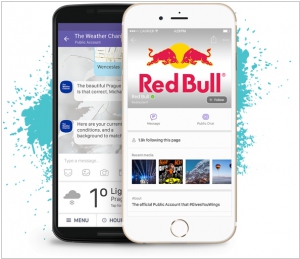
Messaging app Viber is introducing Public Accounts for businesses and brands seeking to engage with Viber users for marketing purposes, customer service, or a combination of both, without the requirement of adding the account as a contact first. Users can now simply subscribe to these accounts. Additionally, by the end of November, Viber's API will be seamlessly integrated with approximately 10 to 15 popular CRM packages, enabling businesses to manage their Viber messages alongside their other social media, email, and messaging interactions. With the introduction of Public Accounts, Viber joins the ranks of other consumer-focused messaging apps such as WeChat, Line, and Facebook Messenger, all of which offer similar features.
2016. WeChat launched Enterprise version
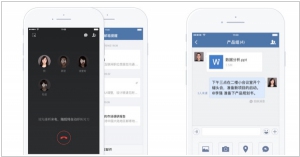
The Chinese messaging platform WeChat has introduced its latest offering, WeChat Enterprise, a free office chat application. Currently, it is exclusively available in Chinese and can be accessed through iOS, Android, Windows, and OS X apps. WeChat Enterprise incorporates various features that will be familiar to users of business chat applications, along with some noteworthy innovations. This service has the potential to replace group emails and facilitate seamless and efficient communication among colleagues. Additionally, it offers convenient add-ons such as the ability for employees to indicate their break times, conduct group voice/text chats, and allows companies to incorporate specific functionalities like automated forms for expense reimbursements, vacation requests, and similar tasks.
2016. Viber adds end-to-end encryption and hidden chats
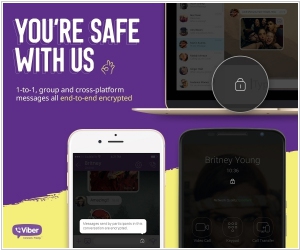
Following in the footsteps of WhatsApp, Viber, another popular messaging app, has introduced end-to-end encryption for all messages and calls on its platform, including group chats (supporting up to 200 people). Additionally, Viber now offers a feature to 'hide' chats on your account, complementing its existing expanded deleting function. These new privacy features are available across Android, iOS, PCs, and Mac desktops, and can be activated by updating to the latest app version (6.0) and reauthenticating the app via QR Code. Viber's encryption provides different levels of security, visually represented by a color-coded lock displayed on the right side of the screen.
2016. WeChat adds VoIP international calls
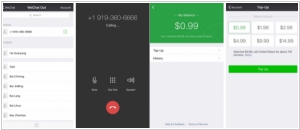
Chinese Internet giant Tencent's popular messaging app, WeChat, is entering the international telephone calling arena, posing a challenge to Skype. Initially launched for users in the U.S., Hong Kong, and India, the new service called 'WeChat Out' will gradually expand to other regions. Setting itself apart from WeChat's existing voice and video calling features, 'WeChat Out' enables users to make calls to actual phone numbers, including both mobile and landline numbers, not limited to WeChat users only. To kickstart the service, WeChat is offering an initial $0.99 credit, equivalent to approximately 100 minutes of calls, but the exact pricing beyond the promotional credit is yet to be disclosed.
2014. Viber adds public chats
Messaging app Viber is set to unveil a new social feature called Public Chats, which allows users to leverage its direct messaging and voice services for broadcasting to a wider audience. With Public Chats, users will have access to live conversation streams from celebrities and other interesting individuals, providing followers with the opportunity to observe the discussions without necessarily participating in them. Users will only be able to engage in Public Chats if the corresponding account is in their contacts. Currently, there is no universal option for enabling public streams, but those who believe their chats are Public Chat-worthy can contact publicchats@viber.com.

